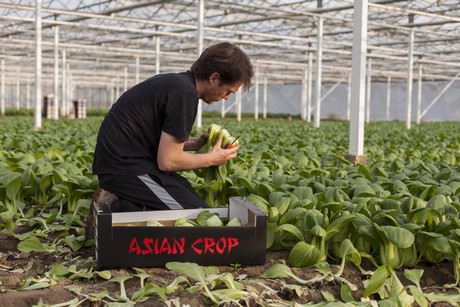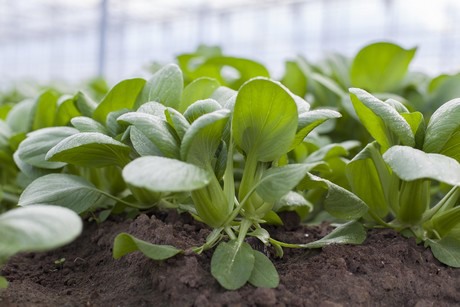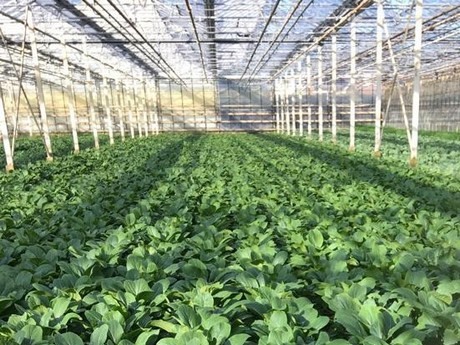While bok choy can be found in any regular Dutch supermarket, people still need to go to Asian supermarkets, also known as tokos, for other Asian leafy vegetables.

“The buying public that frequent tokos is changing,” says Cees Visser of Dutch produce wholesaler, Asian Crop. “An increasing number of Dutch people are discovering these little stores. On the one hand, it may be because people, especially the younger generation, are travelling more. They go to Thailand or Vietnam and are introduced to the local cuisine. You see them trying to copy these meals at home. They are often simple, quick dishes containing lots of vegetables. You also see more and more cooking clubs popping up, where people go in search of unusual ingredients. You can get fresh products and good advice in these tokos. You get personalized assistance, and the staff usually knows exactly what they have in stock in the store. They also know which ingredients you can combine to whip up a tasty meal.”

Blazing a trail
Asian Crop, based in Velden, in the Dutch province of Limburg, cultivates Asian vegetables and sells them locally and overseas. The business began small. In 1999, Cees’ father, Leo, started growing Asian leafy greens in a little corner of his radish greenhouse. “He got the idea after he had visited Thailand and Vietnam. He thought it would be a good idea to give it a try. In the beginning, he would go to the Westland area twice a week, in his little Seat, looking for buyers. He was a real trailblazer, without the help of the internet,” laughs Cees.

500g bags
“We started with Shanghai bok choy, which has now, gradually, become commonplace. This makes sales more difficult as there is increasing pressure on prices. It is crucial to supply consistent quality. Mini bok choy is a variation of bok choy. Mini bok choy gets packaged in 500g bags, which are ideal for two-person meals,“ says Cees. Many of this farm in Velden’s products are sold in 500g quantities.
“Tokos are becoming increasingly professional, with regards to this. In the past, products were supplied in bulk and then packaged by the stores themselves. We are now taking this over.” A characteristic of Asian vegetables is that they are never processed. “These products are used in diverse cuisines, and each of these uses them in a certain way. Take China, for example. It is so large; every region has its own method of preparation. While people in one region will steam the Shanghai bok choy, those in another will finely slice it to use in a stir fry.”
Cees and Danielle and the flowpacker
Export
Asian Crop has been directly exporting its products to the Netherlands’ neighboring countries since 2008. “We also trade in exotics so that we can offer our clients the total package. In this way, we are no longer dependant on a few major buyers; we can serve more clients. More than ever, we have to do our best to get our clients to return. For example, we must ensure that we can always deliver. The client wants to have it tomorrow when he orders today. Preferably with a track and trace, so he can follow the pallet. It is not always easy to meet all these demands, but it is a challenge that is well worth it. After all, a satisfied client does not go looking for business elsewhere,” says Cees.
In the Dutch village of De Kwakel, where Asia van Veen is based, Asian vegetables also go across the border, to, for example, England and Ireland. “It is grown there, but not consistently,” says Jimmy van Veen. This company’s focus, however, lies within the Netherlands’ borders.
Bulk
Although this family business has been around for longer, it has only been in existence in its current form, growing and trading in Asian vegetables, since 2005. They supply wholesalers, tokos, and Asian supermarkets. “We supply our products in boxes of six to eight kg. There is a market for pre-packaged products, but that takes time and money, and freshness must be guaranteed. We are not there yet. Once we deliver the vegetables to the tokos and supermarkets, they are neatly packaged."

Winter imports
At the age of 18, Jimmy joined the family business, set up by his father, Jan, and Jan’s brother, Bert. They farm in a 2,5-hectare greenhouse and also rent additional space. "In the summer, the greenhouse is chock-and-block with Asian vegetables such as kai choy, mini bok choy, choy sam, and Shanghai bok choy. From March to November, we supply from our own cultivation. In the winter, we import products from Spain.”
Increased flexibility
“The market has, however, changed,” says Jim. “Before, you had an established, reliable clientele. Now, the market can be characterized as far more volatile, partly due to the internet. Although the number of regular clientele is smaller, they do know they can get vegetable from us all year round. On the other hand, this kind of market requires us to be more flexible. In the past, Tuesdays and Fridays were set aside for delivering products. Now we do it every day. It also sometimes takes guts to price something more competitively.”
